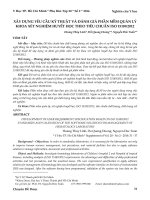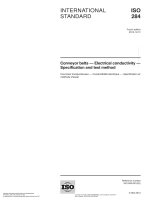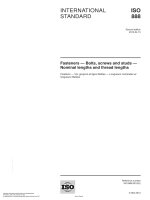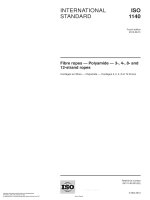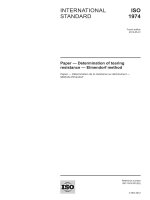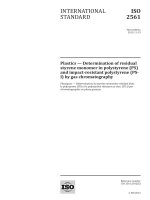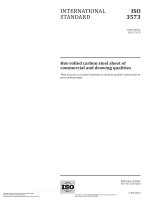Tiêu chuẩn iso 00284 2012
Bạn đang xem bản rút gọn của tài liệu. Xem và tải ngay bản đầy đủ của tài liệu tại đây (152.23 KB, 12 trang )
INTERNATIONAL
STANDARD
ISO
284
--``,,,``,,`,```,,,,`,```,```,,,-`-`,,`,,`,`,,`---
Fourth edition
2012-12-01
Conveyor belts — Electrical conductivity —
Specification and test method
Courroies transporteuses — Conductibilité électrique — Spécification et
méthode d’essai
Reference number
ISO 284:2012(E)
Copyright International Organization for Standardization
Provided by IHS under license with ISO
No reproduction or networking permitted without license from IHS
© ISO 2012
Licensee=University of Alberta/5966844001, User=sharabiani, shahramfs
Not for Resale, 12/02/2013 04:45:39 MST
ISO 284:2012(E)
--``,,,``,,`,```,,,,`,```,```,,,-`-`,,`,,`,`,,`---
COPYRIGHT PROTECTED DOCUMENT
©
ISO 2012
All rights reserved. Unless otherwise specified, no part of this publication may be reproduced or utilized in any form or by any means,
electronic or mechanical, including photocopying and microfilm, without permission in writing from either ISO at the address below or ISO’s
member body in the country of the requester.
ISO copyright office
Case postale 56 • CH-1211 Geneva 20
Tel. + 41 22 749 01 11
Fax + 41 22 749 09 47
Web www.iso.org
Published in Switzerland
ii
Copyright International Organization for Standardization
Provided by IHS under license with ISO
No reproduction or networking permitted without license from IHS
© ISO 2012 – All rights reserved
Licensee=University of Alberta/5966844001, User=sharabiani, shahramfs
Not for Resale, 12/02/2013 04:45:39 MST
ISO 284:2012(E)
Page
Contents
Foreword ............................................................................................................................................................................ iv
1
Scope ...................................................................................................................................................................... 1
2
Normative references ......................................................................................................................................... 1
3
Specification ......................................................................................................................................................... 1
4
4.1
4.2
4.3
4.4
4.5
4.6
4.7
Test method .......................................................................................................................................................... 1
Principle ................................................................................................................................................................. 1
Materials and apparatus .................................................................................................................................... 1
Test pieces ............................................................................................................................................................ 2
Atmosphere for conditioning and testing..................................................................................................... 3
Procedure .............................................................................................................................................................. 3
Expression of results ......................................................................................................................................... 4
Test report ............................................................................................................................................................. 4
Annex A (informative) Variation of electrical resistance with temperature and humidity ............................... 5
Bibliography ....................................................................................................................................................................... 6
--``,,,``,,`,```,,,,`,```,```,,,-`-`,,`,,`,`,,`---
iii
© ISO 2012 – All rights reserved
Copyright International Organization for Standardization
Provided by IHS under license with ISO
No reproduction or networking permitted without license from IHS
Licensee=University of Alberta/5966844001, User=sharabiani, shahramfs
Not for Resale, 12/02/2013 04:45:39 MST
ISO 284:2012(E)
Foreword
ISO (the International Organization for Standardization) is a worldwide federation of national standards bodies
(ISO member bodies). The work of preparing International Standards is normally carried out through ISO
technical committees. Each member body interested in a subject for which a technical committee has been
established has the right to be represented on that committee. International organizations, governmental and
non-governmental, in liaison with ISO, also take part in the work. ISO collaborates closely with the International
Electrotechnical Commission (IEC) on all matters of electrotechnical standardization.
International Standards are drafted in accordance with the rules given in the ISO/IEC Directives, Part 2.
The main task of technical committees is to prepare International Standards. Draft International Standards
adopted by the technical committees are circulated to the member bodies for voting. Publication as an
International Standard requires approval by at least 75 % of the member bodies casting a vote.
Attention is drawn to the possibility that some of the elements of this document may be the subject of patent
rights. ISO shall not be held responsible for identifying any or all such patent rights.
ISO 284 was prepared by Technical Committee ISO/TC 41, Pulleys and belts (including veebelts), Subcommittee
SC 3, Conveyor belts.
This fourth edition cancels and replaces the third edition (ISO 284:2003), of which it constitutes a minor revision.
--``,,,``,,`,```,,,,`,```,```,,,-`-`,,`,,`,`,,`-
iv
Copyright International Organization for Standardization
Provided by IHS under license with ISO
No reproduction or networking permitted without license from IHS
© ISO 2012 – All rights reserved
Licensee=University of Alberta/5966844001, User=sharabiani, shahramfs
Not for Resale, 12/02/2013 04:45:39 MST
INTERNATIONAL STANDARD
ISO 284:2012(E)
Conveyor belts — Electrical conductivity — Specification and
test method
1 Scope
This International Standard specifies the maximum electrical resistance of a conveyor belt and the
corresponding test method.
The test is intended to ensure that the belt is sufficiently conductive to avoid the accumulation of electrical static
charge which can be developed during service use.
This International Standard is not suitable or applicable to light conveyor belts as described in ISO 21183-1[1],
the static electrical properties of which are measured by ISO 21178[2].
The following documents, in whole or in part, are normatively referenced in this document and are indispensable
for its application. For dated references, only the edition cited applies. For undated references, the latest edition
of the referenced document (including any amendments) applies.
ISO 18573, Conveyor belts — Test atmospheres and conditioning periods
3 Specification
The electrical resistance of the conveyor belt when tested in accordance with the method described in Clause 4
shall not exceed 3 × 108 Ω (300 MΩ). Lower values may be specified for special applications.
4 Test method
4.1
Principle
An electric current of specified voltage is passed via electrodes through a suitably prepared test piece taken
from the belt.
4.2
Materials and apparatus
4.2.1 Sheet of insulating material, a little larger than the test piece.
4.2.2 Two cylindrical and coaxial brass electrodes, the base of one being circular and the other annular.
The dimensions and masses are given in Figure 1. The bases of these electrodes shall be machined flat and
polished. A flexible insulated wire shall be connected to each electrode.
4.2.3 Ohmmeter (resistance-measuring instrument), with a range up to 1010 Ω and accurate to ±5 %.
4.2.4 Source of direct current, adjustable to 1 000 V, and not permitting a current greater than 10 mA or
causing an energy dissipation of more than 1 W in the test piece.
The source of current may be either an accumulator or a rectified, stabilized AC-power supply.
1
© ISO 2012 – All rights reserved
Copyright International Organization for Standardization
Provided by IHS under license with ISO
No reproduction or networking permitted without license from IHS
Licensee=University of Alberta/5966844001, User=sharabiani, shahramfs
Not for Resale, 12/02/2013 04:45:39 MST
--``,,,``,,`,```,,,,`,```,```,,,-`-`,,`,,`,`,,`---
2 Normative references
ISO 284:2012(E)
4.2.5 Contact agent (to ensure good contact between electrodes and test piece), having an electrical surface
resistivity no higher than 104 Ω.
A jelly of suitable composition is given in Table 1.
Table 1 — Suitable composition of contact agent
Component
Proportion
mass fraction
Anhydrous polyethylene glycol (molecular mass: 600)
800 mg/g
Water
200 mg/g
Potassium chloride
10 mg/g
Soft soap (pharmaceutical quality)
1 mg/g
--``,,,``,,`,```,,,,`,```,```,,,-`-`,,`,,`,`,,`---
Dimensions in millimetres
Key
1
electrode of minimum mass of 115 g
2
electrode of minimum mass of 900 g
Figure 1 — Electrodes
4.3
4.3.1
Test pieces
Dimensions
The test piece shall be square and shall be cut from the full thickness of the belt. The length of a side shall be
300 mm minimum.
4.3.2
Number
One test piece shall be taken. If the specification requires that two or more test pieces are to be taken but does
not specify how they shall be selected, reference may be made to ISO 282[3].
2
Copyright International Organization for Standardization
Provided by IHS under license with ISO
No reproduction or networking permitted without license from IHS
© ISO 2012 – All rights reserved
Licensee=University of Alberta/5966844001, User=sharabiani, shahramfs
Not for Resale, 12/02/2013 04:45:39 MST
ISO 284:2012(E)
4.3.3
Cleaning of test surfaces
If suitable, clean both surfaces of the test piece by rubbing with Fuller’s earth, (i.e. hydrated magnesiumaluminium silicate), for example, using a clean cloth. After cleaning away all traces of the powder, wipe the
surface with a clean cloth moistened with distilled water, then dry with a clean cloth.
4.4
Atmosphere for conditioning and testing
Before testing, expose the test piece for at least 2 h to one of the standard laboratory atmospheres specified in
ISO 18573. Conduct the test in this atmosphere (see Annex A). An atmosphere of 23 °C ± 2 °C and 50 % ± 5 %
relative humidity is preferred.
4.5
Procedure
4.5.1 Check test room atmosphere.
4.5.2 Paint on one of the surfaces of the test piece the contact agent (4.2.5) in the two areas illustrated in
Figure 2. Great care shall be taken to ensure the accuracy of the dimensions of the areas, but the symmetry
of the centre is not critical. If the test piece surface is flat, this jelly may be painted on the bottom surface of the
cleaned electrodes. In the case of textured surfaces, the two areas shown in Figure 2 shall be painted on the
test piece. The test shall be carried out immediately after painting.
NOTE
In the case of covers with surface undulations, contact between the electrodes and the test piece can be
improved by thin sheets of metal foil of the same dimensions as the brass electrodes, placed on the liquid contact agent and
made to follow the form of the surface by rubbing lightly with the finger. The brass electrodes are then placed on the foil.
4.5.3 Place the test piece on the sheet of insulating material, with the test surface upwards.
4.5.4 Clean the lower faces of the brass electrodes and place them on the liquid contact agent pattern on
the test piece.
4.5.6 Connect the outer electrode to the earth or low-voltage terminal of the measuring instrument.
4.5.7 Connect the inner electrode to the high-voltage terminal of the measuring instrument.
4.5.8 Measure the resistance after applying the voltage for at least 1 min.
--``,,,``,,`,```,,,,`,```,```,,,-`-`,,`,,`,`,,`---
4.5.5 Take care not to breathe on the test surface, as any condensation of moisture may falsify the result.
4.5.9 Repeat the test on the other surface of the test piece.
3
© ISO 2012 – All rights reserved
Copyright International Organization for Standardization
Provided by IHS under license with ISO
No reproduction or networking permitted without license from IHS
Licensee=University of Alberta/5966844001, User=sharabiani, shahramfs
Not for Resale, 12/02/2013 04:45:39 MST
ISO 284:2012(E)
Dimensions in millimetres
Key
1
--``,,,``,,`,```,,,,`,```,```,,,-`-`,,`,,`,`,,`---
4.6
contact agent (4.2.5)
Figure 2 — Design to be painted on the test piece
Expression of results
For each surface of the belt subjected to test, record the electrical resistance, in ohms.
4.7
Test report
The test report shall include the following information:
—
complete designation of the conveyor belt material and the manufacturing date;
—
reference to this International Standard, i.e. ISO 284:2012;
—
test room temperature and relative humidity;
—
conditioning period;
—
contact agent applied;
—
voltage applied to the electrodes;
—
results of the tests;
—
date of test;
—
any deviations from the standard test.
4
Copyright International Organization for Standardization
Provided by IHS under license with ISO
No reproduction or networking permitted without license from IHS
© ISO 2012 – All rights reserved
Licensee=University of Alberta/5966844001, User=sharabiani, shahramfs
Not for Resale, 12/02/2013 04:45:39 MST
ISO 284:2012(E)
Annex A
(informative)
Variation of electrical resistance with temperature and humidity
A.1 General
The materials used for the covers of conveyor belts are, in terms of electrical resistance, sensitive to their
temperature-history and their strain-history. This phenomenon arises because of the structural configuration
of the conductive particles (e.g. carbon) in the polymer and the degree of their orientation, which can change,
between the manufacturing stage and installation due to the strain-history of the belt.
The antistatic properties of the covers of conveyor belts are also influenced by their electrostatic charging
characteristics, which are related to their relative permittivity, a full discussion of which can be found in
IEC 60250[4].
A.2 Conformity
--``,,,``,,`,```,,,,`,```,```,,,-`-`,,`,,`,`,,`---
The surface electrical resistance of a conveyor belt cover as measured by this method may vary if the
temperature in the test laboratory varies during the test and will fall dramatically if the relative humidity rises
above 50 %. If a test result does not prove conformity with the requirements of this specification, it is advisable
for the test to be repeated at the higher limit of temperature and humidity required by the product specification.
5
© ISO 2012 – All rights reserved
Copyright International Organization for Standardization
Provided by IHS under license with ISO
No reproduction or networking permitted without license from IHS
Licensee=University of Alberta/5966844001, User=sharabiani, shahramfs
Not for Resale, 12/02/2013 04:45:39 MST
ISO 284:2012(E)
Bibliography
[1]
ISO 21183-1, Light conveyor belts — Part 1: Principal characteristics and applications
[2]
ISO 21178, Light conveyor belts — Determination of electrical resistances
[3]
ISO 282, Conveyor belts — Sampling
[4]
IEC 60250, Recommended methods for the determination of the permittivity and dielectric dissipation
factor of electrical insulating materials at power, audio and radio frequencies including metre wavelengths
--``,,,``,,`,```,,,,`,```,```,,,-`-`,,`,,`,`,,`---
6
Copyright International Organization for Standardization
Provided by IHS under license with ISO
No reproduction or networking permitted without license from IHS
© ISO 2012 – All rights reserved
Licensee=University of Alberta/5966844001, User=sharabiani, shahramfs
Not for Resale, 12/02/2013 04:45:39 MST
--``,,,``,,`,```,,,,`,```,```,,
Copyright International Organization for Standardization
Provided by IHS under license with ISO
No reproduction or networking permitted without license from IHS
Licensee=University of Alberta/5966844001, User=sharabiani, shahramfs
Not for Resale, 12/02/2013 04:45:39 MST
--``,,,``,,`,```,,,,`,```,```,,,-`-`,,`,,`,`,,`---
ISO 284:2012(E)
ICS 53.040.10
Price based on 6 pages
© ISO 2012 – All rights reserved
Copyright International Organization for Standardization
Provided by IHS under license with ISO
No reproduction or networking permitted without license from IHS
Licensee=University of Alberta/5966844001, User=sharabiani, shahramfs
Not for Resale, 12/02/2013 04:45:39 MST
